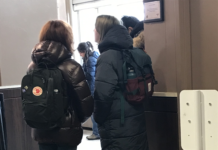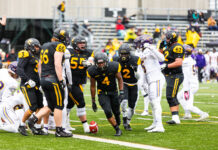The Waterloo Climate Institute held its first-ever climate convention on March 16, with the goal of fostering cross-disciplinary collaboration, highlighting community initiatives and promoting climate change awareness and education.
Tola Titcombe is a chemical engineering masters student and member of the student council who helped bring the convention to life. “We’ve had climate leaders’ conferences prior to this,” she said, “but this is climate con’s first year.”
Titcombe explained that her experience as a masters student fostered a passion about the interdisciplinary nature of climate action, and has shown her how people are siloed into different disciplines when discussing climate change. “This conference was an opportunity to bring all student voices together for us to know, at this stage where we’re trying to build our foundation, that there’s other voices to be heard, there’s more sides of climate action to be known and learned about.”
She added that because the concept of climate action in academia is relatively new, “people feel alone and actually want to connect with people, they’re doing all this work and they want people to know what they’re doing… they also want to know where to start.” She said that the convention provided opportunities for people to do things like listen or find partners for research projects.
Various environmentally-focused groups attended, including GreenHouse, a social impact incubator. Mulei Mao, a student ambassador for GreenHouse, explained his experience attending GreenHouse’s Social Innovators and Training program, which he said helped him define problems, ideate solutions and pitch stories to develop a sustainable protein snack brand.
Mao said that GreenHouse hoped to find more students interested in sustainability and social-related issues to join because they “feel like the community is the most important part when you’re working on a sustainable project or a social project, and we help provide that space for students to come and develop their ideas or scale an idea that they already have.”
Jacob Gilbert, events coordinator for Reep Green Solutions, an environmental nonprofit operating in Waterloo region, said that he attended in hopes of connecting with as many people in the community as possible, especially due to the convention’s focus on social and environmental issues. Gilbert explained that Reep aims to help people live more sustainably and reduce their energy consumption. The organization runs several programs, such as backyard tree planting programs and home energy evaluations, where they identify weaknesses in a home, different ways to insulate it, and help homeowners enroll in grant and loan programs to fund methods of reducing their energy consumption.
“Ultimately, our goal is to help educate people as much as [we] can and provide them with the resources and knowledge… that they need to become more energy efficient,” he said.
Brenda Panasiak, a representative for WICI (Waterloo Institute for Complexity and Innovation), explained that WICI’s goal for the day was to promote their existence and networking hub to students who might be interested in complex systems, which “in a very basic sense are the study of interactions of different elements.”
“There’s multiple factors involved not just with studying and understanding climate change but also with creating action and affecting change in the future,” Panasiak said. WICI, a UW-Senate-approved research institute since 2010, has a networking hub bringing together complex systems researchers and enthusiasts across Canada and the world.
She voiced her belief that complex systems science could help “illustrate very clearly how components interact, which I think supports researchers in spreading their message.”
Titcombe said that despite having attended UW for six years, she didn’t know such opportunities for connection over the topic of climate change existed. “In terms of impact, I’m not sure how that would be measured, but I see more students realizing that there [are] more ways for them to be impactful, there’s communities for them,” she said, praising the work she had seen presented by undergraduate students at the convention.
With files from Brendon Poste.































